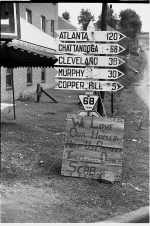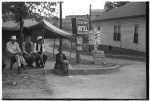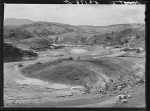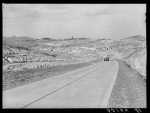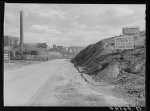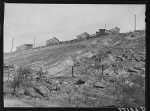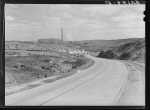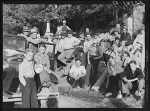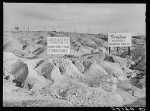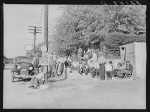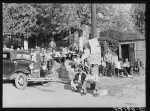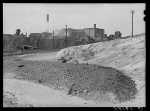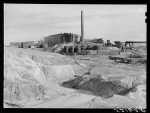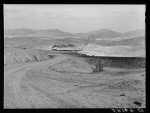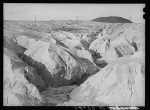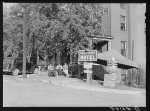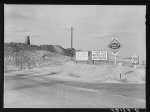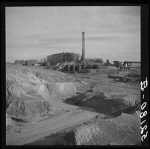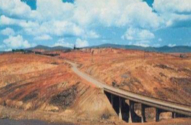
| Home |
| Email John |
| Page Created
02/0108 Last update 02/17/2009
|
Copper Hill, TN
In the Beginning
In the late 19th century, Copper was discovered in Copper Hill, TN. A very high quality ore in the form of copper sulfide. And so Tennessee's copper industry was born. Copper was to be mined from the area for almost 100 years until overseas competition and union misbehavior drove the mines and the refining plant out of business.
The copper was located such that deep vertical shaft mining was used. The ore was hauled out of the mines on elevators and transported a short distance to the roasting plant where the ore was roasted to drove off the sulfer.
In the beginning, the roasters were wood fired. Eventually all the surrounding forests were clear-cut to supply wood to the furnaces. When the wood ran out, coal was brought in by rail.
Initially the roasters were open topped and the sulfur in the form of sulfur dioxide and sulfur trioxide was allowed to escape to the air. When these chemicals encountered moisture in the air they formed sulfurous and sulfuric acids respectively. This "acid rain" killed what vegetation remained after the clear-cutting. The result was the barren bright red, heavily eroded hills that Copper HIll is famous for.
Later in about the 20s, sulfuric acid became as valuable a commodity as copper and so the open roasters were enclosed and the sulfur compounds converted to acid. The most prominent part of the plant is, in fact, the "acid house" that contains massive lead lined rooms where sulfur dioxide is catalytically combined with oxygen to make sulfur trioxide. This trioxide is dissolved in water to make sulfuric acid.
When the roasters were enclosed, essentially the acid release was halted but the damage was done. The ground was too acid for anything to grow. The acid, combined with the copper leaching out of the tailings made the creeks run a gorgeous emerald green. By the time I reached high school age in the 60s, Copper Hill was still mostly a barren red land with emerald creeks.
To the 70s
Fast Forward to the 70s. Copper Hill had become a tourist attraction in addition to an industrial community. The bright red hills and the emerald streams were pretty in their own ways and most of us locals had come to love 'em. Then Big Brother steps in.
This time, in the form of TVA, who in their "we're from the government and we're here to help you", "We know what's best for you so STFU and let us do your thing" standard operating procedure, decided that Copper Hill needed to be greened. So they came in and started planting pine trees. Little scrubby things. Millions spent, sometimes to drop them in by helicopter. In the beginning the locals killed the trees about as fast as TVA could plant them. But TVA, having infinite resources and time, finally wore the locals down and by the 90s the area was but a ghost of what it was. Now the place looks somewhat like western scrubland.
TVA did deign to leave one small area near the Burra Burra mine alone. Gee thanks.
The Present
So here we are in 2008. The scenery's gone thanks to TVA. The mine and acid plant have long since been closed, mainly because of decades of union violence and also the mass exodus of manufacturing from the US. In fact, the Chinese are up there now mining the tailings for metals that they can make money on. After boating the waste across the ocean, that is. What's wrong with this picture?
The 1996 Summer Olympic Whitewater Competition
In 1996 the Summer Olympic Whitewater competition was held on the Ocoee river that drains out of Copper Hill. Like other towns who've lost/driven out their industrial base, Copper Hill thought that tourism would be the savior. Yaaaa, minimum wage service jobs replacing union scale manufacturing jobs. Good plan.
When the event was announced, there was literally greed rolling in the streets. A newspaper editor stopped by my restaurant and asked me how I was going to get rich off the Olympics. I told her that I'd be sitting back doing the same thing I always did while watching everyone else lose their butts. And you know, that's just what happened.
The athletes were housed in a prison compound constructed on the campus of Lee College in Cleveland that would make Gitmo proud and were bussed directly back and forth from the site. Ticket holders were bussed up US-411 from Atlanta in the morning and bussed back at night. Meanwhile the hysteria whipped up by the media, the Chambers of Commerce and the money folks of Cleveland scared all the locals away. All but approximately 5 Clevelanders left town.
That left my restaurant a ghost town. Until a highway patrol cop stumbled in. He apparently liked it and go on the radio because for the rest of the week I was filled to capacity with cops. One of 'em told me that they had 80% of the THP force in Ocoee for "anti-terrorism security". That told me that they have 80% too many cops, since the state did just fine without 'em.
Organized River Rafting Starts
Anyway, after the Olympics, something just had to be done with the course. The course where they dug out all the natural river rocks and shot in gunnite (cement) rocks to replace 'em. Pansy-assed Olympians apparently couldn't handle a natural river...
Anyway again, after an extended battle between TVA (we're here to serve you) and the rafting companies that had formed businesses while the Ocoee #2 power house was being rebuilt and water flowed in the river, TVA finally agreed to release water to the river on weekends - but only after the rafters coughed up a per-head tax ($5, I think it was.) to apease TVA, the "we're here to help you" bunch.
Of course, TVA knew better than the market how many rafting companies there should be on the river so they only allowed a certain number. Interestingly enough, exactly the number of companies that existed when the agreement was formed. Good for the companies. Bad for the customers and others who want to start companies.
As it stands now, if you're not going on an organized run with a rafting company, the Ocoee area is a fairly unfriendly place. TVA got a private act passed that lets them be yet another federal police force. So we have cops from TVA, forest service, Polk county and whatever surrounding jurisdictions decide to let a few guys come over for the weekend. They're all dying to show how much they want to help you by giving you expensive tickets. For such awful acts as letting your tire touch (not be on, just touch) the pavement when you pull over to watch.
Back to Copper Hill
OKokok... Back to Copper Hill and Ducktown. There are some interesting things to do and see around there. And there are some forest service campground, one with hookups, and some pull-off-the-road spots. I'll get to all that later.
Recently I learned that the Library of Congress has been putting selections of their digitized imagines and films collection on Flickr. There are some fabulous photos there including some color ones of Copper Hill during WWII and some other black and white ones from the teens.
The photos are kinda scattered around through the Flickr collection plus I found more photos at the LOC webpage itself plus I have some of my own. So I decided to put up this page and host them all in one place along with some color commentary from yours truly.
Without further adieu, let's do some pictures. Click on any thumbnail to see the original.
This first batch is from the Library of Congress. These were taken in the 1942 timeframe.
 This
is Copper hill in the 40s. Georgous isn't is?
This
is Copper hill in the 40s. Georgous isn't is?
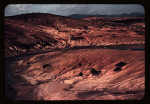

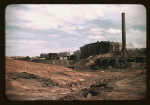 Photo
of the "Acid House" where the sulfuric acid was made
Photo
of the "Acid House" where the sulfuric acid was made The
acid was stored in those black tanks before being loaded onto rail cars.
The
acid was stored in those black tanks before being loaded onto rail cars.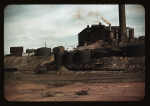
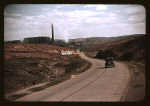 The
road between Copper Hill and Ducktown. The acid plant is over the hill
to the left
The
road between Copper Hill and Ducktown. The acid plant is over the hill
to the left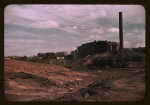
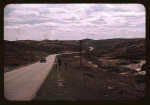
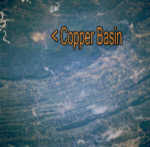 As
seen from space.
As
seen from space.
Today. Kinda boring looking, isn't it?
The previous two photos are from here
Next we have some Black and White photos mostly from old newspaper archives. Again, compliments of the Library of Congress.
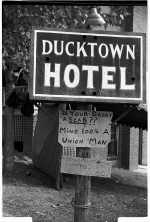
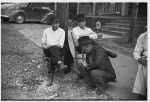
These photos are from around Ducktown and Copper Hill during a strike in the teens. Copper Hill didn't do very well with the strikes, as they were a major factor in the plant finally closing.
